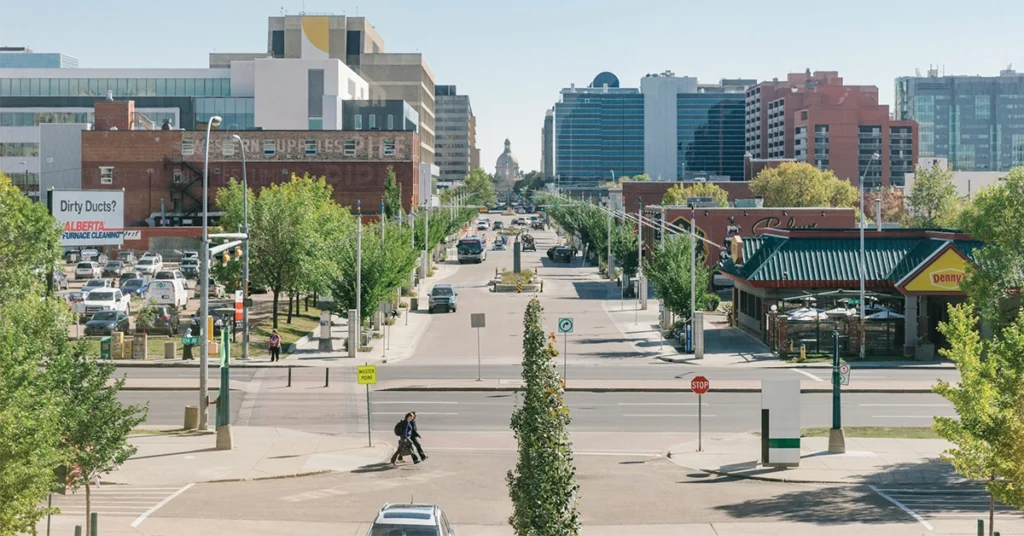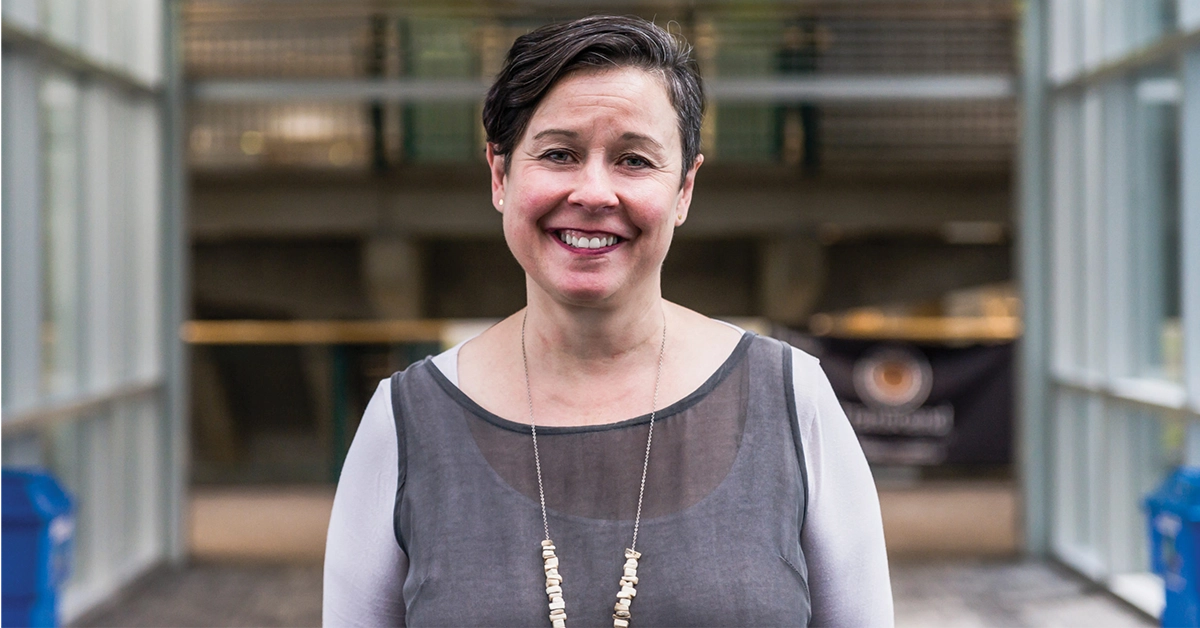“It’s a new day — absolutely a new day,” says Michelle Plouffe, MacEwan University’s vice-president, general counsel, and compliance officer. “I’m just tickled.”
That day dawned on July 1 when Deborah Saucier began her term as MacEwan’s fifth president, filling the position previously held by David Atkinson.
The appointment is a first, not only for Saucier, the former provost and vice-president academic of the University of Ontario Institute of Technology (UOIT), but also for MacEwan, which celebrates its first female president since the institution was founded in 1971.
“I’m so excited that we’ve got not only a new leader, but someone who brings a different perspective to the discussions we have,” Plouffe adds from her second-floor office at the school’s City Centre Campus. “She’s a mom, she’s got a family, and she’s a person first and foremost.”
“I think we define ourselves by who we include. That’s what I think a city university is.”
—Deborah Saucier
“She’s (also) bright and serious and is pretty intense in her own way, but in a way that’s not heavy. She says good morning to everybody, she’s smiling all the time, focuses on the positive side and the opportunities as opposed to the negative or risks.”
An experienced administrator with a resumé that includes leadership roles at two other Canadian universities, Saucier is also an acclaimed neuroscientist known for studying the different navigational preferences of men and women. Psychology students at MacEwan may even recognize her name from their textbooks.
Originally an animal behaviourist, Saucier began her “love affair” with cognitive neuroscience in the mid-1990s while earning a doctorate at Western University in London, Ont. By 2006, she was a Canada Research Chair and associate professor of psychology at the University of Lethbridge, where she became the chair of the department of neuropsychology in 2009.
But an offer to serve as dean of science at UOIT in Oshawa, Ont., two years later drew her and her family back east, where she rose to the position of provost and vice-president academic in 2014.
That was, of course, until earlier this year, when an executive search firm asked her to consider a position as MacEwan’s president.

“It took me about three seconds to say ‘Yes,’” Saucier says, seated in her office around the corner and down the hall from Plouffe. “I had completely fallen in love with this place. It’s got a social justice focus, it’s got fine arts — which I confess, at a STEM-based institution, I really missed.”
Along with her husband, Canadian artist and curator Chai Duncan, and their nine-year-old daughter, Saucier moved to Edmonton in March. Now, in early August and with only six weeks on the job, she’s already settled in, taking calls, meetings, and the occasional text message from an Apple Watch that chimes softly on her left wrist.
“There is something about the land that really makes me feel rooted,” she adds. “I know what the rhythms of the land here are like — although this summer I can’t tell you what’s going on. I sold this (move) to my husband as ‘It’s all blue sky, Simpsons clouds, and it never rains,’ and it’s done nothing but rain here since I came.”
The return to Alberta is a kind of homecoming for Saucier, since most of her family lives in Western Canada. But she has a deeper, spiritual connection to the prairies as well.
Born in Saskatoon and raised in Regina, Saucier is also a member of the Central Urban Métis Federation. It’s an important part of her heritage, and one that figures prominently, not only in her personal and professional life but also in her vision for MacEwan.
Braided sweetgrass and bundles of buffalo sage for smudging lay on the coffee table in her office, next to a copy of The Secret Path, the graphic novel by Gord Downie and Jeff Lemire, and Speaking My Truth, an edited collection of stories from residential school survivors — a subject that triggers a gravelly shift in her voice.
“I deliberately keep these here to remind people when they come to visit me that we do have this residential school business,” Saucier explains. “I often quote senator (Murray) Sinclair — sometimes paraphrasing poorly — but I do believe that if education got us into this mess, education can get us out.”
It’s that faith in education as a transformative experience that drove her not only to academic administration but also to MacEwan, a downtown university that she believes is uniquely positioned to effect positive social change.
Turning around in her chair, Saucier points to a window overlooking 104 Avenue.
“Looking south, you have a very different view of what Edmonton is than if you go to the other side of this building and look north. I think that’s the fundamental challenge of a city university: all cities, particularly cities outside of the three biggest ones, have those two solitudes in them — the downtown, urban core that’s business oriented, and then the downtown group of people who are less advantaged,” she explains.
She’s bright and serious and is pretty intense in her own way, but in a way that’s not heavy. She says good morning to everybody, she’s smiling all the time, focuses on the positive side and the opportunities as opposed to the negative or risks.
-Michelle Plouffe
“In the morning, I often see people walking through our campus, looking for bottles to go to the bottle exchange on the north side. It would be a shame if MacEwan stopped serving those people. They’re as much a part of the community as the bankers and lawyers to the south of us, and I think that MacEwan has a role to play in transforming the lives of all Albertans.”
And that mission resonates with Plouffe, who says she’s looking forward to working with the president in the coming months to develop a human rights, diversity, and equity office at the university.
“When you talk to Deb about what her presidency is all about, she’ll talk about things like access to education, how critical it is, or indigenous programming,” Plouffe says. “Being more inclusive, diversity and equity are huge priorities for her. This means a lot to me because these are areas I’m trying to build within the institution.”
Saucier hopes that MacEwan will act as a bridge — a place where worlds connect, rather than a wall that keeps people out.
“Some institutions define themselves by who they exclude,” Saucier says. “And I think we define ourselves by who we include. That’s what I think a city university is.”





0 Comments